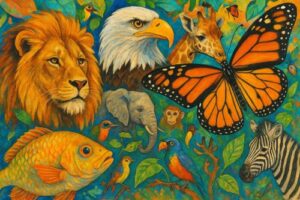
In the scientific world, the term animal (Kingdom Animalia) refers to a broad and incredibly diverse group of living organisms. All animals share several key characteristics that distinguish them from other forms of life, such as plants or fungi. Firstly, animals are multicellular, meaning their bodies are composed of many cells. They are also eukaryotes, which are organisms whose cells contain a nucleus and other specialized structures enclosed within membranes.
Another defining trait is that all animals are heterotrophs, meaning they must consume other organisms for energy and nutrients. Unlike plants, which produce their own food through photosynthesis, animals must eat to survive. They typically digest their food internally. Lastly, most animals are motile, especially during some stage of their life cycle. This means they can move spontaneously and independently. From the smallest insects to the largest whales, these shared traits define what it means to be an animal on a fundamental biological level.